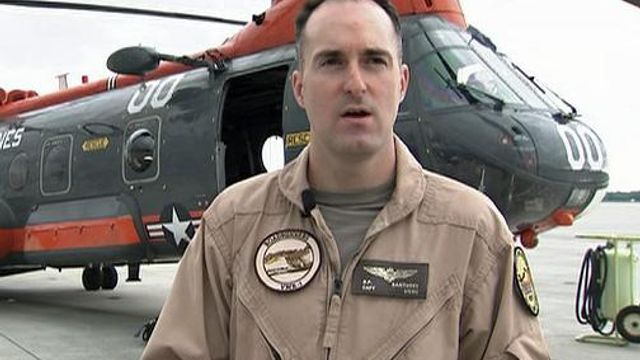Even in slow storm season, Marine rescue team stays sharp
Members of the Marine search and rescue helicopter crew based at Cherry Point keep sharp with regular patrols. They fly the coast line looking for anyone who might be in trouble and work with the Coast Guard to search for and rescue civilian boaters or swimmers in danger.
Posted — UpdatedThursday marks the peak day of hurricane season. All across North Carolina, first responders are training and preparing for the next time storms bring a need for their unique skills.
Ten years ago, after Hurricane Floyd swamped much of the eastern part of the state, rescue helicopters made the difference between life and death for people trapped by rising water.
Members of the Marine search and rescue helicopter crew based at Cherry Point keep sharp with regular patrols. They fly the coast line looking for anyone who might be in trouble and work with the Coast Guard to search for and rescue civilian boaters or swimmers in danger.
They also respond to military emergencies.
“We've had a couple of Harrier crashes in the past couple of years and we've been on scene between five and ten minutes,” Capt. Brian Santucci said.
When a hurricane heads for the North Carolina coast, these guys in the “Pedro” unit are among the first responders.
After Floyd hit in 1999, they rescued nearly 400 people from trucks, cars and rooftops.
“We can take injured personnel or pull people off roofs. We can also drop our medical technicians down there to render medical assistance,” Santucci said.
Hospital Corpsman First Class Ray Munn is one of the medics on board. “I'm able to intubate a patient if I have to, give them oxygen, give them any kind of life support they need,” he said.
The unit is one of only two search and rescue crews in the entire Marine Corps and boasts the Corps only Marine Rescue Swimmers.
“If it involves getting in the water, I can do it,” Sgt. Brandon King said. “Myself or the or the corpsman can hoist to a rooftop and pick people off rooftops.”
That makes this unit one of the state's most valuable rescue assets after a storm passes.
After Hurricane Floyd, State Emergency Management officials added uniformed helicopter rescue training for agencies across the state. If another big storm hits, officials say Marine, Coast Guard and other units will be better able to coordinate rescue efforts.
• Credits
Copyright 2024 by Capitol Broadcasting Company. All rights reserved. This material may not be published, broadcast, rewritten or redistributed.






